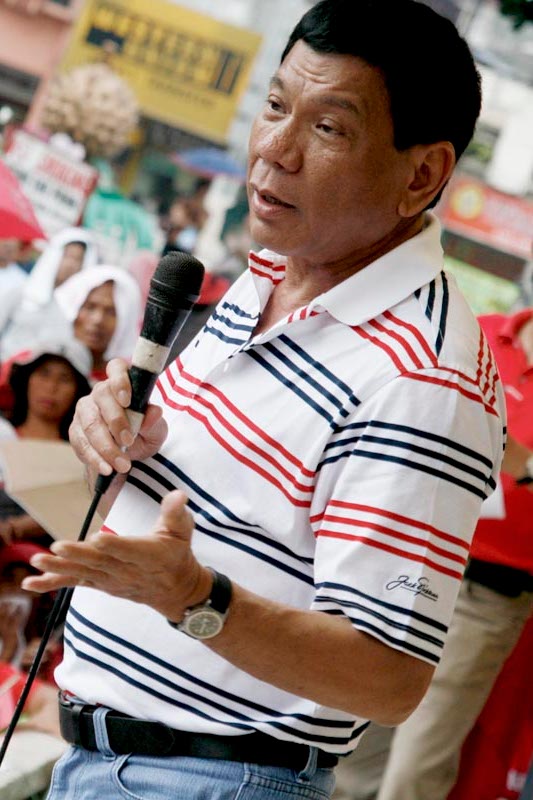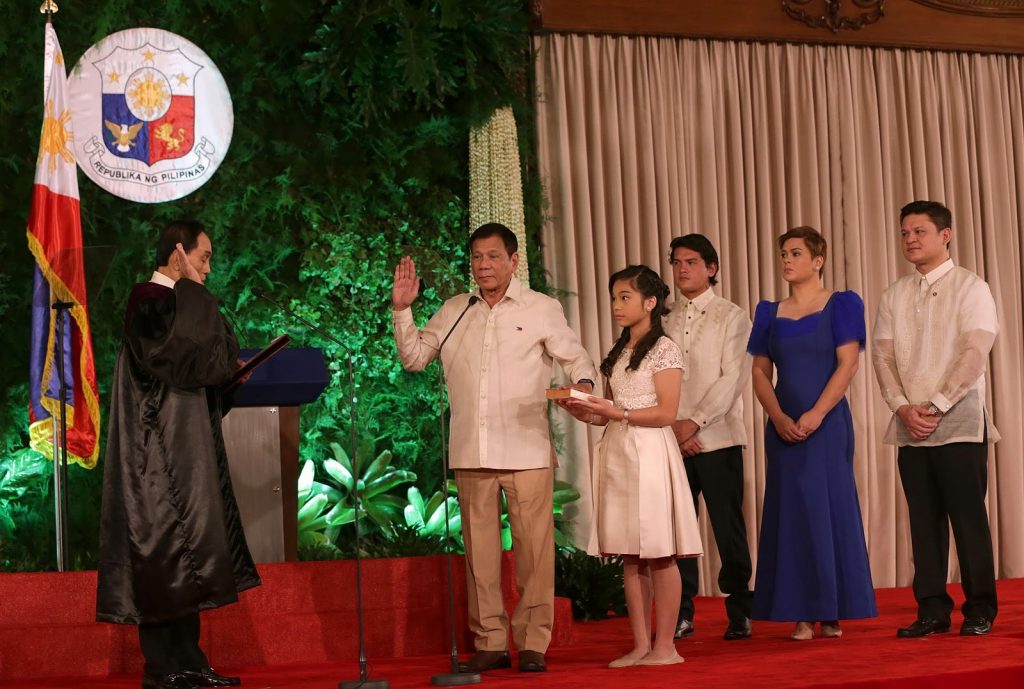by Garrett Dee
語言:
English
Photo Credit: Presidential Communications Operations Office
FILIPINO PRESIDENT Rodrigo Duterte’s campaign of extrajudicial killings of suspected drug users and pushers in the Philippines, a campaign which claimed thousands of lives and left Filipino society on edge, had already come under fire because of its brutality. However, the recent revelation by Duterte that as mayor he had personally participated in the killings in order to provide an example to his police force is a disturbing indication of the future of rule of law in the Philippines, as well as having disturbing implications for the future of governance in the Asia Pacific region.
The campaign, largely perpetrated through anonymous drive-by slayings which often face no legal consequence, has left over two thousand Filipinos dead at the hands of the police alone, some of which are as young as 17. Though the campaign has been repeatedly touted by the Duterte government as the most effective way to end the issue of substance abuse in the country, the apparent scarcity of oversight has deep ramifications for the state of Filipino civil society.
For starters, mental health issues are often neglected in areas of the Philippines, and data shows that the availability of services to citizens with mental health difficulties, particularly those dealing with substance abuse, are especially uneven. According to the latest data provided by the World Health Organization, mental health expenditures in the Philippines are quite low, with only five percent of the health budget being allocated to mental health issues. Of that five percent, less than ten percent is spent on those with substance abuse problems.
 Rodrigo Duterte. Photo credit: WikiCommons
Rodrigo Duterte. Photo credit: WikiCommons
In addition to this, the killings seem mostly targeted at those without means, and in many cases has left wealthier citizens untouched. In some more affluent areas, police go door to door handing out pamphlets warning against the dangers of drug use, and influential members of drug trafficking operations have the ability to shield themselves against the targeted assassinations.
Despite falling under heavy criticism for these inconsistencies, however, the Duterte administration retains consistently high approval ratings in the Philippines, and the campaign does not appear poised to stop anytime soon. Duterte’s brutal mechanisms of governance are founded upon the strictest interpretation of rule of law; namely, that since the law is the basis of order for society, anyone who steps outside the boundary of the law subsequently steps out of of society and therefore loses their right to the equitable treatment afforded to other people.
This policy is justified by appeal to its effectiveness in ending the rampant drug problem in the Philippines. But in this, one is, of course, labelling extermination of human beings as being effective. Imagine, if you would, the governments of the United States and Canada deciding the best way to end the rampant opioid abuse problem in North America was to dispatch police to execute all addicts. Undoubtably, this would be considered unacceptable to the thousands of people whose family members and loved ones are addicts.
To some this may seem like mere sentimentality, after all, they might argue, these people conscientiously chose to participate in illegal activity and therefore understood the consequences of their actions. However, under this system, the government is given free rein to decide what exactly those consequences might be, and no judicial or extragovernmental process is applied to decide whether those consequences are indeed commiserate with the crime committed. In some cases, people are executed in their homes in front of their children or outside of schools and other public places, and the killers operate with near impunity.
The controversy brings to light clashes over the notions of proper governance by nations like the Philippines and those of Western liberal democracies, who have been Duterte’s primary critics. In a broader sense, we can see that appeals to “human rights” and ideals as put forth by Western liberalism, as a foundation for policy decisions and a delineation of appropriate governmental action, no longer carry the same kind of weight in Asia as a strict interpretation of legality and social order based on governmental dictation. Apart from moralistic concerns, these killings also seem to predicate a broader shift in mentality amongst Asian nations seeking to move away from the influence of Western interventionism.
 Photo credit: Presidential Communications Operations Office
Photo credit: Presidential Communications Operations Office
This in large part returns to China’s strong initiative to brand itself to its neighbors an an alternative to the moralistically heavy-handed United States, which many nations see as having had an unfairly imperialistic domination in the region for decades. This can be seen in Beijing’s willingness to step in an provided weapons and support for Duterte’s ongoing campaign where the US and EU offered naught but criticism.
Indeed, despite previous territorial disputes over holding in the South China Sea, China and the Philippines have enjoyed a rapprochement since Duterte’s ascendancy to the presidency, with Duterte even going as far as to declare his intentions to break with the United States and ally the Philippines with China during a visit to Beijing this year. China’s leaders have responded favorably towards the Philippines, lifting trade sanctions that were damaging the Filipino economy and conceding fishing rights to Filipino fisherman in previously disputed waters. Beijing has even voiced its support for Duterte’s anti-drug campaign, promising to provide Duterte with weapons under a twenty-five year repayment program which, in Duterte’s words, meant they “were practically giving” him the weapons.
This is further compounded by the fact that the Chinese confiscation of an unmanned US scientific drone that had commanded so much international attention occurred not far off the coast of the Philippines, waters which are outside China’s territorial claim of the “nine-dashed-line”. Direct Chinese action of this nature against US vessels has been uncommon, and the fact that the Chinese chose the waters off the coast of the Philippines as the location to send what has been viewed as a probable response to Trump’s comments on Taiwan and the One China idea may be an indication of the current state of Chinese-Filipino relations.
However, as with all things related to the future of US involvement in Asia, in light of the incoming Trump administration, the winds of change seem imminent when it comes to renegotiating where nations stand in the overall political makeup of the region. For starters, Donald Trump and Duterte share a similar leadership and communication style that draws natural comparisons, both favoring frank and unpolished communication in addition to a strongman leadership style which favors direct, unilateral action over introspection and deliberation.
 Donald Trump. Photo credit: Michael Vadon/CC
Donald Trump. Photo credit: Michael Vadon/CC
In this regard, if one is to take Duterte’s comments at face value, their recent phone conversation upon Trump’s election seems to express a level of confidence that the Philippines will not be breaking away from the United States as quickly as originally envisioned. According to the Filipino president, incoming US president Trump expressed his support for the government’s handling of the drug problem as being appropriate and seemed to imply that the United States would take no future action in obstructing it.
It would seem, therefore, that regardless of whether the Philippines chooses to align itself with Beijing or Washington, the age of the United States playing the role of advocate for a human-rights-based approach to government in Asia is drawing to a close. If this is true, what the implications for the region will be remain to be seen. It may be that the United States—fearing Asian nations with strong authoritarian pasts flocking to a newly ascendant China that is willing to not make democratic development a precondition to economic cooperation—may be willing to give up its policy of liberal interventionism and allow leaders like Duterte more leeway lest they leave the US fold en masse.
Many Asian nations, Taiwan included, are young democracies with the shadows of authoritarian rule still within living memory. Though Taiwan’s democratic transition has been strong enough to presume it will not return to authoritarianism, the same cannot be claimed about several nations in the region which as yet still lack strong foundational democratic institutions. Through its history, the United States already has repeatedly backed authoritarian regimes to further its own geostrategic goals, and should conflict continue to boil between the United States and China, it is not inconceivable that many more nations might go the path of the Philippines.

